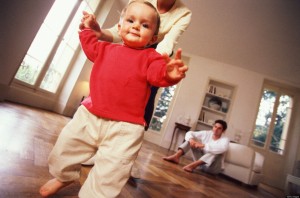When families get together, they like to share stories from the past. They’ll bring up the time when you were a baby and dumped a bowl of cheerios on your head, or the stressful time when you were teething. They will even go as far as bringing up the embarrassing poopy diaper stories. While they are fun to hear, you just can’t remember these moments; it is almost as if you weren’t there. But why? At what age do we just erase the memories from our past?
This memory loss is referred to as Childhood Amnesia, which basically means adults can’t retrieve memories from the past. Psychologist at Emory University decided to document the earliest age that we begin to loose our memory. In the research, 83 children at the age of three are interviewed by their parents about six past experiences; such as trips to the zoo, or their birthday. They then returned to the study, only once between the ages of five through nine, being asked to recall the events that they spoke about at the age of three. It was found that children between the ages of five and six remembered more of the events, their descriptions of the events weren’t the best. However, the children ages seven and nine remembered fewer events, but the ones they did were expressed and described them with more detail. Why? Well, children don’t have the strong neural processes like adults do, and that is required to pull together all the needed pieces for the autobiographical memory.
I guess if you think about it, as a baby, there is a lot of information that we have to retain. In my opinion, I think we loose our early memories in order to make room for the endless amount of information to come.
Sources:
http://esciencecommons.blogspot.com/2014/01/psychologists-document-age-our-earliest.html


It’s kind of funny, because for some of my family members first birthday’s they’ll get a HUGE party. I was always the one wondering if it were necessary, because they would never remember the experience. However, I think I have grown to understand that that is a mindset that the parents have accepted.
I also believe that taking children to new places, and allowing to experience different things at a young age, even though they may not remember does allow them to make connections and grow. For example if a young child watches a toddler show, or reads a book, or even plays one of those educational games, they see different kind of animals. If you take that child to the zoo, they will see similar animals, in real life, and will probably make that connection. They may even have an idea of the name, or the sound the animals make, and that experience alone allows the child to grow. Not a lot, but a little bit at a time.
Yeah, I am sure it varies a little from person to person.
I think we tend to forget our earliest memories, because our brains aren’t fully developed, and there is also a lot of information to retain in the future. I think we remember our ABC’s because it is something that is repeated over and over. Therefore, even if a child were to forget, they would quickly be reminded.
I never thought of it as childhood amnesia. I also think it varies from person to person. I can remember my kindergarten graduation but anything before than is blank and has to be filled in with pictures and stories from my family. I think it is really weird for our memories to just disappear. Do you think that this could because our brains have to develop to a certain point for us to retain personal information? Because we remember our Abc’s but never when we actually learned them. Very interesting post!
We were actually just discussing this concept in another class of mine! I find it intriguing how parents insist on their children participating in/experiencing certain childhood events, such as going to the zoo, when in reality there is a high chance that the child will not remember this experience. Do you think this is a developed mindset parents have come to accept or this experiencing events such as this are essential in childhood development? This article suggests that taking children to new places allows for their ability to make connections to grow, but what do you think?